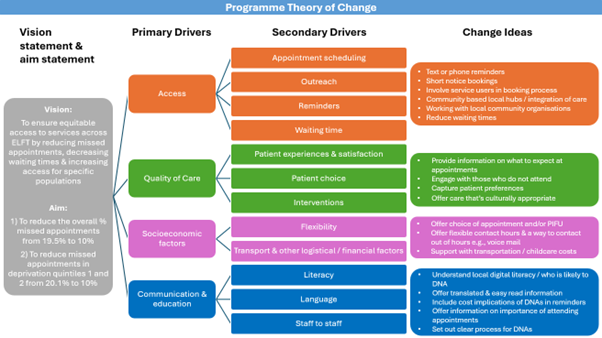
The Pursuing Equity Programme: Reducing Missed Appointments and Closing the Care Gap
9th July 2025
Sarah McAllister (Head of Improvement Programmes)
At East London NHS Foundation Trust (ELFT), we believe everyone deserves equal access to care—no matter where they live. Yet for many, this has not been a reality. In our communities, people living in the most deprived areas are significantly more likely to miss their healthcare appointments than those in more affluent areas. Behind each missed appointment is a missed opportunity—for care, for connection, for support.
The Pursuing Equity Programme was launched to change that.
A Shared Commitment to Fairer Access
This Trust-wide initiative brought together 31 diverse teams from across mental health, community health, children’s services, primary care, and specialist services—including perinatal care, diabetes, continence, psychotherapy, personality disorder, integrated mental health, neighbourhood teams, and neurodevelopmental teams. Despite their varied contexts, all teams shared a common goal: to reduce missed appointments by understanding and addressing the underlying causes—especially for those facing the greatest barriers.
With support from colleagues in Quality Improvement, Data & Analytics, Population Health, People Participation, and Digital, teams worked in partnership with service users to test locally tailored ideas and learn what really makes a difference.
What’s Worked? Ideas That Deliver Results
Over the space of the last year, teams have been testing practical, creative solutions to reduce missed appointments. The teams now have a strong degree of belief in several ideas that have been shown to reduce missed appointments across an array of settings.
- 📞 Scheduling appointments with service users, not for them
Admins or clinicians book first or follow-up appointments while the service user is present, or over the phone with them—no random letters, no missed chances. - 📱 Automated and personalised text reminders
These timely nudges help people remember appointments and plan ahead. - ✅ Clear and consistent DNA policies
Making sure everyone—from staff to service users—understands what a missed appointment is, how to record missed appointments and what happens when appointments are missed. - Culturally relevant communication: In some teams, admin staff used scripts in multiple languages or reframed appointment letters to feel more inclusive and accessible.
Some teams introduced creative adjustments to local processes—for instance, redesigning letters with input from service users, piloting reminder calls by known staff members, using Patient Initiated Follow Ups, connecting with service users in community hubs or other spaces beyond the typical clinic environment and thinking about the location and ease of access to buildings where appointments were held. These changes, while practical, reflect a deeper shift: from a system that works around people to one that works with them.
Of the 15 teams currently active in the programme, 73% have already seen a reduction in missed appointments through the changes they’ve been testing—an encouraging sign of what’s possible when equity is at the heart of improvement!
Service Users Leading the Way
Crucially, service users have been at the heart of this programme. Teams involved people with lived experience to co-design interventions, review appointment letters, advise on communication strategies, and reflect on the emotional and practical barriers to attending appointments.
Learning sessions—held monthly—featured direct input from service users, enabling teams to hear firsthand how missed appointments are experienced, and what changes matter most. One powerful insight that shaped many teams’ work: for some service users, an unexpected phone call from a clinician (rather than a planned contact) can feel intrusive or unsettling. This led to a deeper exploration of how telephone appointments are recorded and delivered, and how expectations can be better managed.
Building a Culture of Learning and Equity
The programme didn’t just support individual teams—it nurtured a learning culture across the Trust. Monthly learning sessions provided space for peer learning, co-reflection, and shared problem-solving. Teams also had access to a “change idea menu” based on the programme’s theory of change, offering evidence-informed strategies under four key drivers: access, quality of care, socioeconomic factors, and communication.
In addition to team-level support, the programme partnered with the Trust’s Digital team to enhance digital appointment systems, and with the Population Health and Poverty Proofing leads to test new tools designed to tackle deprivation-related barriers.
To support data-driven improvement, teams received regular reports highlighting missed appointments across key equity metrics—such as deprivation, gender, ethnicity, age, and sexual orientation—giving them a clearer picture of who was most affected and where to focus their efforts.

Looking Ahead: Wrapping Up, Scaling Up
The Pursuing Equity Programme will formally conclude at the end of July 2025, but the work doesn’t stop there. We’re moving into our next phase:
- 📦 Creating a change package to share what’s worked across ELFT
- 🔁 Embedding successful ideas into teams’ daily practice
- 🎯 Local coaches will provide targeted support for teams still wanting to continue the work
- 📊 Supporting services to plan how they’ll use the time they’ve saved
Final Thoughts: Equity is Everyone’s Business
The Pursuing Equity Programme is showing us what’s possible when we unite around a shared goal: to deliver care that’s fair and equitable for all. We’ve made incredible progress—and learned a huge amount. Now, it’s time to build on that momentum, share our learning, and continue working to make every appointment count.
Because when we reduce missed appointments, we don’t just improve efficiency—we give people their chance to be seen, heard, and cared for, and that’s what equity looks like.
Most Read Stories
-
Why is Quality Control important?
18th July 2018

-
An Illustrated Guide to Quality Improvement
20th May 2019

-
2016 QI Conference Poster Presentations
22nd March 2016
-
Recognising Racism: Using QI to Help Take Action
21st January 2021

-
Using data enabled us to understand our problem
31st March 2023

-
QI Essentials: What does a Chief Quality Officer do?
18th March 2019


Follow QI on social media
To keep up to date on the latest concerning QI at ELFT, follow us on our socials.


